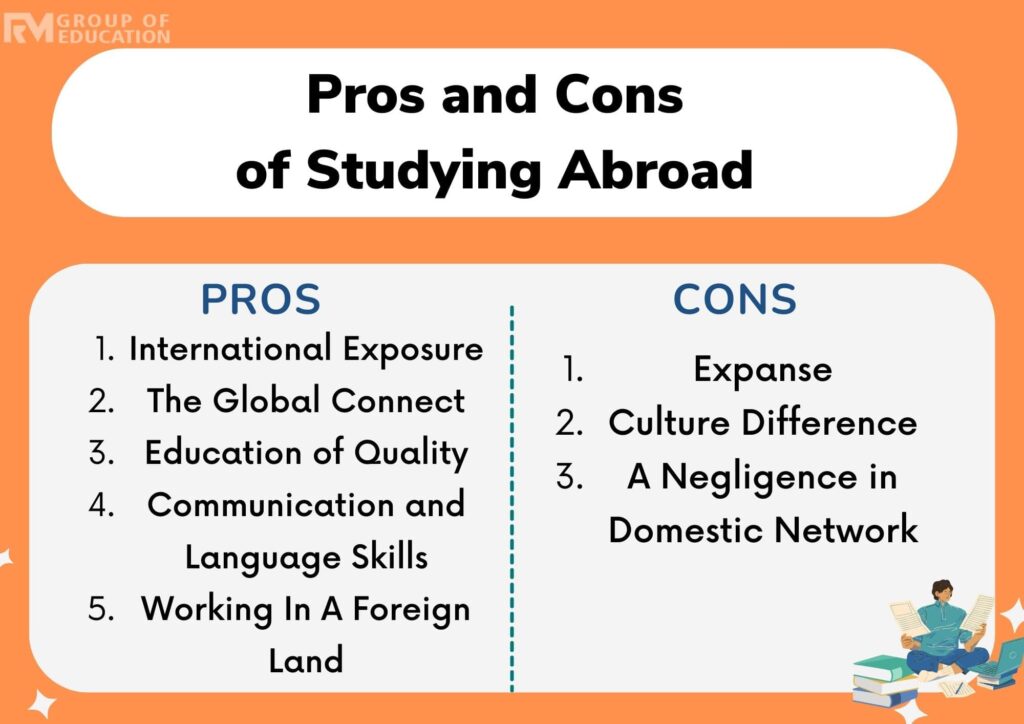Advantages and Disadvantages of Studying Abroad: In the past, getting a degree from abroad was seen as prestigious and only for the privileged. Now, things have changed; even middle-class families can afford it. Some countries even offer free education for international students. Studying abroad has many benefits, but it also comes with challenges. That’s why it’s important to carefully weigh the pros and cons before deciding.
Studying mbbs abroad does sound fascinating, but not all fascinating thing comes without their pros and cons. So, in this article, readers will learn about the advantages and disadvantages of studying abroad.
Subscribe to RM Group of Education Newsletter, Get Admission, Fees, Seats etc.
Contents
Advantages and Disadvantages of Studying Abroad
Studying abroad has both advantages and disadvantages. This section will explain the Advantages and Disadvantages of Studying Abroad. Let’s see what they are.
Advantages of Studying Abroad
1. International Exposure
You do not get an everyday opportunity to meet and mingle with people of different countries and cultures. If you are looking to experience life outside in a different country and its culture, getting to study in a university belonging to that country is by far the most straightforward way to achieve it. You could try to get a direct job abroad or perhaps find some personal measure of obtaining residentship.
2. The Global Connect
Studying for a long period helps form lasting relationships between students. Situations that can take you outside your comfort zone and test your instincts in the unknown can make you far more adaptive than if you were to choose to live out your young adulthood in your parent’s basement. This is even more pronounced when you live outside your domicile city. And if, as in our present discussion, you live outside your country, you will be able to build relationships with individuals from different cultural backgrounds. Such a circumstance is fertile with learning possibilities beyond the university curriculum. You will learn to appreciate the differences and expand on your skills – communication, social, and interpersonal.
3. Quality of Education
The USA, Canada, the UK, and Australia are popular study destinations, hosting nearly 60% of the world’s top universities. Earning a degree from these or other top universities can boost your career. Many Western countries, including the USA, invest heavily in STEM research. Other countries like Germany, Finland, Switzerland, Israel, South Korea, and Japan also allocate significant funding for STEM research.
4. Communication and Language Skills
As a regular full-time international student, you will constantly communicate with classmates from various backgrounds. The nature of international programs tends to be far more interactive than, say, the purely instructional mode of the traditional Indian classes. For instance, the American education system encourages class discussions, debates, and active student participation. This improves communication skills and confidence in expressing yourself to others, including authority figures.
5. Working In A Foreign Land
Studying abroad offers the chance to earn a living in a foreign country with greater potential for career and salary growth. Additionally, it often comes with the benefit of graduating with a work permit.
6. Makes you Independent
Studying abroad will make students independent as they can apply for internships or part-time jobs while studying abroad. Students abroad do part-time from high school and save money for the future. Similarly, even Indian students can save money while studying abroad by doing a part-time job or an internship.

Disadvantages of Studying Abroad
1. Expense
Not going to lie, but in some countries, education costs can be as high as buying a luxury car. Barring the fortunate few who can secure some form of funding assistance – scholarship, fellowship, graduate assistantship – the rest have to shoulder the cost associated with their decision to study abroad. Tuition fees are not just the problem. We have living expenses, food expenses, utility expenses and whatnot.
2. Cultural Difference
This might not be new to you, but adapting to an unfamiliar society can be a rude shock, especially if you struggle to adjust. Many students find it difficult to accept customs that may seem uncivil in their own culture. For example, addressing professors by their first names is normal in the USA but feels alien in India. This is why people from the same country often stick together, especially when language differences add another layer of challenge.
3. A Negligence in Domestic Network
The time spent overseas building a global network of friends and colleagues is time spent losing out on a professional and personal network back home. So, if you decided to return to your home country, you would be at a disadvantage compared to your friends who stayed back. This is especially apparent if you choose to look for a career and move back home.
4. Language as a barrier
Along with the great perks, language still acts as a barrier for international students. They can face problems while communicating or understanding lectures, which can demotivate students.
So, now that you have seen both the good and the bad of studying abroad. Whether you want to go for it or not is up to you. However, remember that no matter what, studying abroad does open a lot of doors for you, and it is worth the hype. It only depends on the person and their willingness to overcome the obstacle.
Frequently Asked Questions (FAQs)
What are the Advantages of Studying Abroad?
The following are the advantages of studying Abroad:
>International Exposure
>The Global Connect
>Quality of Education
>Communication and Language Skills
What are the Disadvantages of Studying Abroad?
The following are the disadvantages of studying Abroad:
>Expense
>Cultural Difference
>A Negligence in Domestic Network
>Language as a barrier
Which country is free for Indian students?
The following are the countries free for international students:
>Germany
>Norway
>Belgium
>Sweden
>Austria
>Finland
>Greece
Is studying abroad good?
Studying abroad is a good option as it will help students broaden their horizons as they are introduced to new cultures and new people with different beliefs. It can also help students in making connections as well as in their careers.
Can poor Indian students study abroad?
Of course, there is no rich and poor when it comes to education; it is all about knowledge. Several scholarships are open to students, and the government of India also provides a scholarship option for academically intelligent students.

